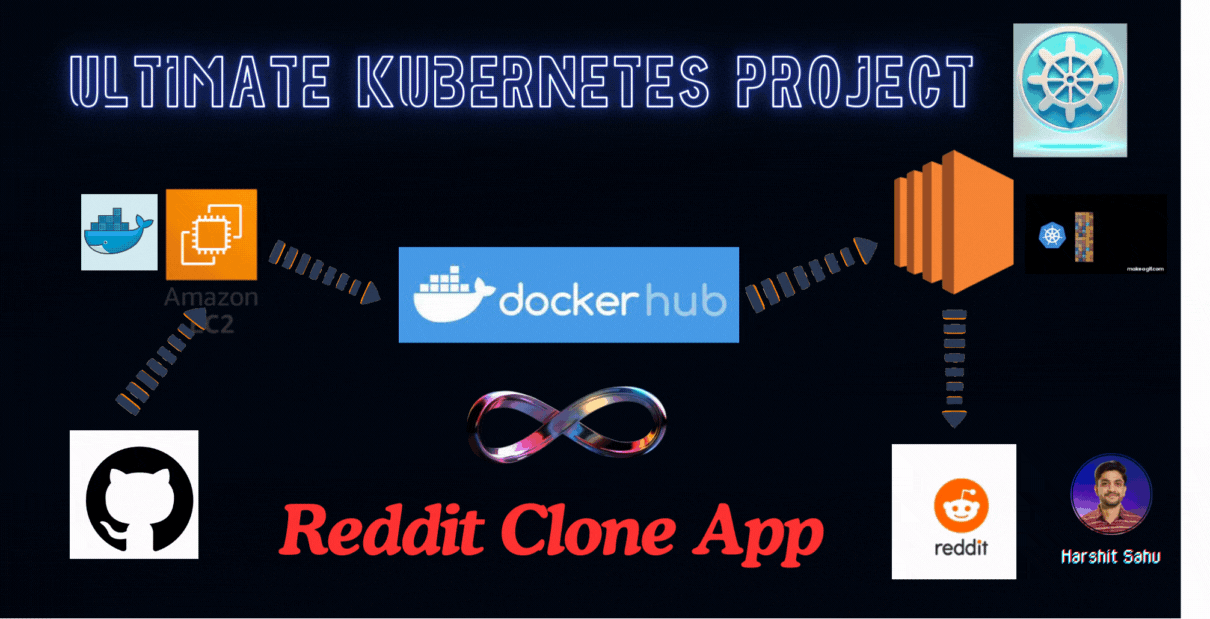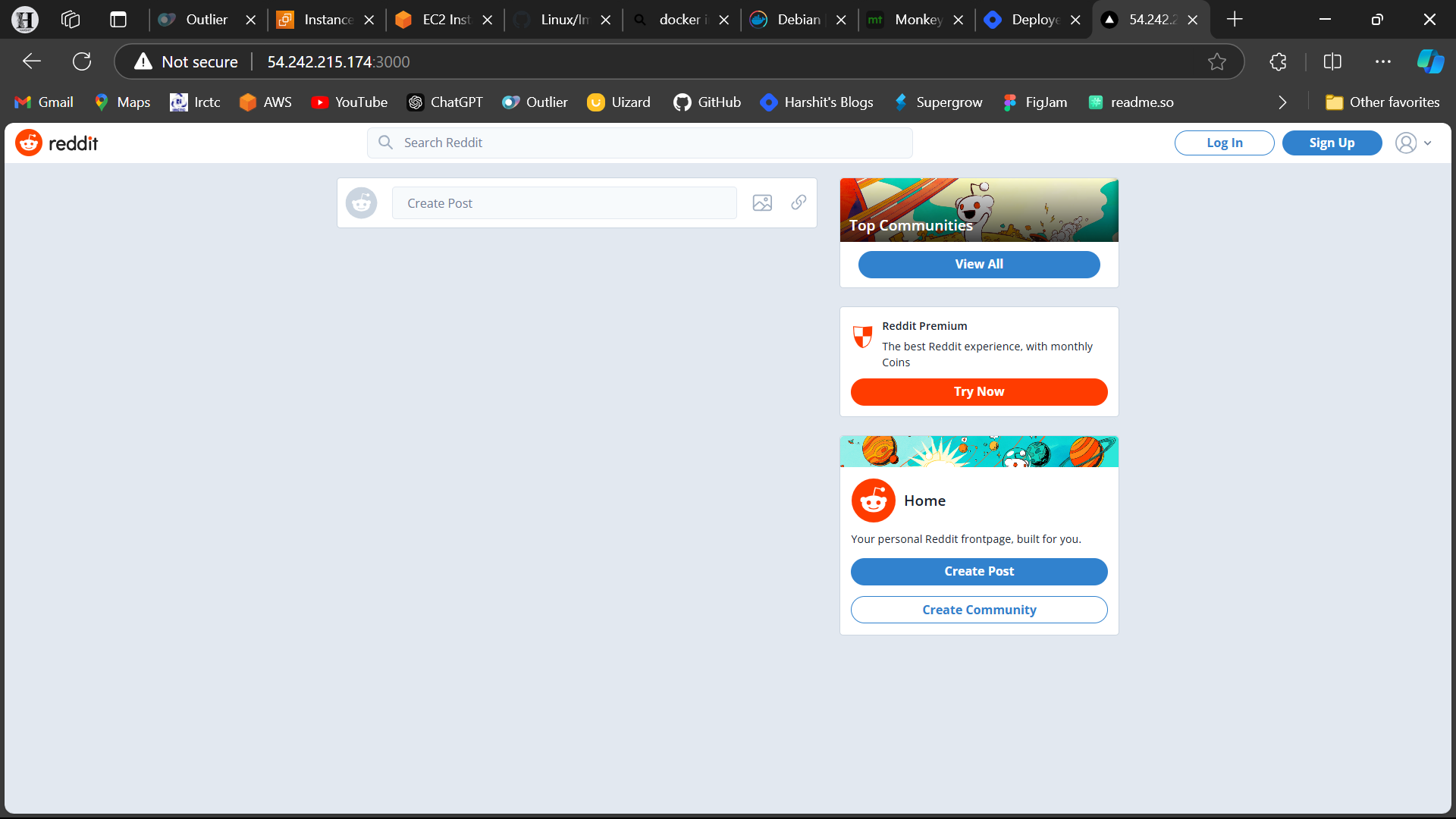Ultimate Kubernetes Project Using Ingress
 Harshit Sahu
Harshit SahuTable of contents
- STEPS TO BE DONE BEFORE STARTING THE PROJECT:
- Step 1: Clone the Source Code
- Step 2: Containerize the Application with Docker
- Step 3: Build the Docker Image
- Step 4: Push the Image to DockerHub
- Step 5: Write Kubernetes Manifest Files
- Step 6: Deploy the Application to Kubernetes
- Step 7: Configure Ingress
- Step 8: Expose and Test the Application

In this guide, we will walk through the steps to deploy a Reddit clone application on a Kubernetes cluster with ingress enabled for external access.
STEPS TO BE DONE BEFORE STARTING THE PROJECT:
Launch Two Instance in AWS, one with t2.micro and other with t2.large and install docker and Kubernetes.
You can Install all this by doing the below steps one by one. and these steps are for Ubuntu AMI.
# For Docker Installation
sudo apt-get update
sudo apt-get install ca-certificates curl
sudo install -m 0755 -d /etc/apt/keyrings
sudo curl -fsSL https://download.docker.com/linux/ubuntu/gpg -o /etc/apt/keyrings/docker.asc
sudo chmod a+r /etc/apt/keyrings/docker.asc
echo \
"deb [arch=$(dpkg --print-architecture) signed-by=/etc/apt/keyrings/docker.asc] https://download.docker.com/linux/ubuntu \
$(. /etc/os-release && echo "$VERSION_CODENAME") stable" | \
sudo tee /etc/apt/sources.list.d/docker.list > /dev/null
sudo apt-get update
sudo apt-get install docker-ce docker-ce-cli containerd.io docker-buildx-plugin docker-compose-plugin
sudo usermod -aG docker $USER && newgrp docker
sudo chmod 777 /var/run/docker.sock
# For Minikube & Kubectl
curl -LO https://storage.googleapis.com/minikube/releases/latest/minikube-linux-amd64
sudo install minikube-linux-amd64 /usr/local/bin/minikube
sudo snap install kubectl --classic
minikube start --driver=docker
Step 1: Clone the Source Code
Here do this all step in Instance with t2.micro configuration.
Start by cloning the source code for the Reddit clone. You can do this with the following command:
git clone https://github.com/harshitsahu2311/reddit-clone-kubernetes-projects
Step 2: Containerize the Application with Docker
Next, create a Dockerfile to containerize the application. Use the following content for the Dockerfile:
FROM node:19-alpine3.15
WORKDIR /reddit-clone
COPY . /reddit-clone
RUN npm install
EXPOSE 3000
CMD ["npm", "run", "dev"]
Step 3: Build the Docker Image
Now, build the Docker image by running the command below. Replace <DockerHub_Username> and <Imagename> with your DockerHub username and the image name you want to assign:
docker build -t <DockerHub_Username>/<Imagename> .
Step 4: Push the Image to DockerHub
Once the image is built, push it to DockerHub:
Log in to DockerHub:
docker login -u <DockerHub_Username>Push the image:
docker push <DockerHub_Username>/<Imagename>
Alternatively, you can use the existing Docker image: harshitsahu2311/reddit-clone-app.
Step 5: Write Kubernetes Manifest Files
Kubernetes acquires high memory and also needs more CPUs that’s why we will do all this steps in our Instance with t2.medium configuration.
Deployment.yml
Create a deployment file (Deployment.yml) to define the pods for the application:
apiVersion: apps/v1
kind: Deployment
metadata:
name: Reddit-clone-deployment
labels:
app: kuber-project
spec:
replicas: 2
selector:
matchLabels:
app: kuber-project
template:
metadata:
labels:
app: kuber-project
spec:
containers:
- name: result-app
image: harshitsahu2311/reddit-clone-app
ports:
- containerPort: 3000
Service.yml
Create a service file (Service.yml) to expose the application:
apiVersion: apps/v1
kind: Service
metadata:
name: Reddit-clone-service
labels:
app: kuber-project
spec:
type: NodePort
ports:
- port: 3000
targetPort: 3000
nodePort: 31000
selector:
app: kuber-project
Step 6: Deploy the Application to Kubernetes
Now that the manifest files are ready, you can deploy the application to Kubernetes. Run the following commands:
kubectl apply -f Deployment.yml
kubectl apply -f Service.yml
Check the status of your deployment and service:
kubectl get deploy,svc
You can check it now also by doing Step 8. Directly and accessing it with <public_ip>:3000 but I am doing it with ingress only.
Step 7: Configure Ingress
Ingress in Kubernetes allows external traffic to access services within the cluster by defining routing rules. Let's configure ingress for the Reddit clone.
First, enable ingress in Minikube (if you're using Minikube):
minikube addons enable ingress
Next, create an ingress.yml file:
apiVersion: networking.k8s.io/v1
kind: Ingress
metadata:
name: ingress-reddit-app
spec:
rules:
- host: "domain.com"
http:
paths:
- pathType: Prefix
path: "/test"
backend:
service:
name: reddit-clone-service
port:
number: 3000
- host: "*.domain.com"
http:
paths:
- pathType: Prefix
path: "/test"
backend:
service:
name: reddit-clone-service
port:
number: 3000
Apply the ingress configuration:
kubectl apply -f ingress.yml
Verify the ingress setup:
kubectl get ingress ingress-reddit-app
Step 8: Expose and Test the Application
To expose your deployment, run:
kubectl expose deployment reddit-clone-deployment --type=NodePort
kubectl port-forward svc/reddit-clone-service 3000:3000 --address 0.0.0.0 &
You can now access the application via the Minikube IP and the NodePort (31000):
curl -L http://<minikube_ip>:31000
To test the ingress, use:
curl -L domain.com/test
You can also access the deployed application via the EC2 instance's IP address on port 3000 (ensure port 3000 is open in your EC2 security group).

Congratulations! You have successfully deployed a Reddit clone on Kubernetes with ingress enabled.

Subscribe to my newsletter
Read articles from Harshit Sahu directly inside your inbox. Subscribe to the newsletter, and don't miss out.
Written by

Harshit Sahu
Harshit Sahu
Enthusiastic about DevOps tools like Docker, Kubernetes, Maven, Nagios, Chef, and Ansible and currently learning and gaining experience by doing some hands-on projects on these tools. Also, started learning about AWS and GCP (Cloud Computing Platforms).